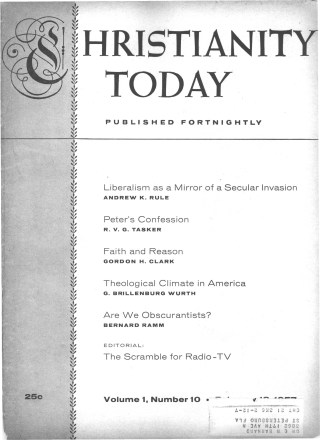The average church-goer does not hear many sermons from Genesis these days. Writers of Sunday School materials seem to handle the earlier chapters rather gingerly where these cannot be avoided altogether. The opinion is expressed in many quarters that the older parts of this first book of the Bible are interesting fables of a bygone era.
Literary criticism of the kind which separates the books of the Old Testament into supposedly earlier documents began first with Genesis. The majority of the commentaries which have been written since 1825 have dealt in some way with this divisive type of criticism. Many commentaries openly advocate the documentary theories and to the extent that they do so they often cease to be commentaries on the actual meaning of the text. Most graduates of the better seminaries since 1875 have been acquainted with the views of Julius Wellhausen, who declared that large sections of Genesis are completely fictional.
The Importance Of Genesis
The effects of a rationalistic handling of Gensis have been felt in every part of biblical studies including that of the New Testament. A surprisingly large amount of New Testament teaching is built upon the foundation laid in Genesis. Luke’s genealogy of our Lord Jesus Christ traces the Saviour human ancestry back to Adam through the patriarchs listed in Genesis. The principle of justification by faith is the life and experience of Abraham, who believed God and it was accounted to him for righteousness, Genesis 15:6. The doctrine of human sin as set forth in Romans 5 may not be understood apart from Genesis 3. The paradise which is regained in Revelation 21, 22, with its tree of life for the healing of the nations, is obviously the eternal counterpart of that which was lost in the Genesis narrative. One’s understanding of the whole biblical revelation will undoubtedly be colored by his understanding of Genesis.
The Structure Of Genesis
The style of Genesis indicates even to the casual student that the book as we have it comes from one hand. There is, for one thing, the unusual structure of the book. After the account of the creation which is given in the first chapter, there appears in Genesis 2:4 an expression which introduces the remaining parts of the book. It is said, “These are the generations of the heaven and the earth when they were created.” There are nine other sections given over to “generations.” There are the generations of Adam, of Noah, of the sons of Noah, of Shem, of Terah, of Ishmael, Isaac, Esau and Jacob.
The structure of the book is progressive. The writer carefully traces the rise of the nation of Israel, the covenant people of God in his day. He shows how God kept alive the knowledge of himself in the great apostasy before the flood and the ignorance after it. With the calling of Abraham in chapter 12 there began the selective process by which God chose a people for his own possession. An individual, a son of idolatrous parents, is called to be a child of God. Yet the choosing of the individual is to result in universal blessing for the promise is, “Through thee and thy seed shall all the families of the earth be blessed” (Genesis 12:3). Whenever it is necessary for the writer to go beyond the limits of God’s chosen line as he does, for example, when he traces the families of Cain, Ham, Japheth, Ishmael and Esau, he returns abruptly to the children of God. He is like a navigator on a river who may for a short time explore its tributaries, but who returns to follow the main stream to its mouth.
The book of Genesis is plainly supernatural in its viewpoint although there are certainly fewer miracles recorded in it than in the gospel accounts. The objections which may be brought against the supernatural elements in Genesis may be brought with almost equal force against all that is miraculous in the Christian faith, including the casting out of evil spirits by our Lord Jesus Christ or even his resurrection.
Those who are convinced that God was working in all the events of past ages to introduce his plan of redemption will find that there is growth in the Messianic hope and promise in Genesis. The seed of the woman will bruise the serpent’s head, 3:15. The promise here might refer to any human being. Yet the line of blessing is narrowed among the descendants of Noah to the family of Shem, 9:26, 27. The calling of Abraham and later the blessing of Jacob narrowed the line still further. In Genesis 49:10 the tribe of Judah is selected as the one through which the purpose and kingdom of God will be wrought.
Aids To The Study Of Genesis
There are several commentaries on Genesis which will prove rather sterile since they devote their pages to a documentary analysis rather than an effort to elicit the message of the book. The best helps to the pastor and teacher are those works which recognize that Genesis was written for a theological purpose. The Interpreter’s Bible in its first volume contains a commentary on Genesis. Although the exegesis is marred, in this writer’s opinion, by documentary divisions, there are many useful insights into the meaning of the text. Several of the introductory articles in the volume will be found helpful although the position of some writers is a refinement of that of Julius Wellhausen and is highly subjective at many points. The text is divided into exegesis and exposition. The latter is sometimes rather imaginative. The writer, Walter Russell Bowie, shows a vast acquaintance with literary material which may serve for purposes of illustration.
One of the most valuable of recent commentaries is that of H. C. Leupold, An Exposition of Genesis (1953). Leupold gives a verse-by-verse interpretation of the text but he attempts to deal with a number of archeological problems as well. An older commentary which has recently been made available through reprinting is that of Robert S. Candlish, Commentary on Genesis. Candlish does not give a thorough exegesis but rather devotes himself to an exposition and application of whole passages. His work is really in the nature of a biblical theology of Genesis which is a distinct advantage in our day. Not the least valuable aspect of this commentary is the fact that it relates Genesis to the rest of biblical revelation. Other reprints which rank high in scholarship are available to the pastor who is willing to dust off his Hebrew Bible. Among these are the commentary by Franz Delitzsch in the famous Keil and Delitzsch series and that of Otto Zockler in the Schaff-Lange series. The student who has had no instruction in Hebrew will find such commentaries a bit more cumbersome than others but still very helpful. An up-to-date, one-volume work on the whole Bible is The New Bible Commentary (1953). It is uniformly conservative but necessarily brief.
No student of the Old Testament should rely upon commentaries alone. Genesis is largely historical. The movements of the patriarchs and the peculiarities of their culture may best be understood with the use of a good atlas and a Bible dictionary. Several excellent volumes are obtainable. The Westminster Historical Atlas has been revised as recently as 1956. As a companion volume the Westminster Bible Dictionary is not as complete as the International Standard Bible Encyclopedia or the recently revised Schaff-Herzog Encyclopedia, but it is somewhat more convenient. J. Howard Kitchen is the author of a fine historical geography of the Holy Land entitled Holy Fields (1955).
Finally, it would be foolish to ignore the bearing of archeology upon our understanding of Genesis. The number of books on this subject is almost endless. Two come to mind as being particularly readable and helpful. These are Light from the Ancient Past (1946) by Jack Finegan and Archeology and Bible History by Joseph Free. The latter is well-known in evangelical circles in America. The former contains some conclusions which are influenced by an attitude toward the Bible with which some readers will not agree, but it is well-documented and has a moderate approach.
Anyone who comes to the book of Genesis expecting to find in it a revelation of the timeless purpose of God’s grace will see the book open before him in many surprising ways. He will draw from it treasures new and old, to enrich his own life and experience as well as those of his hearers.












